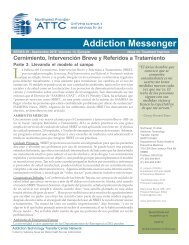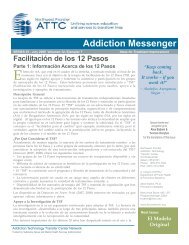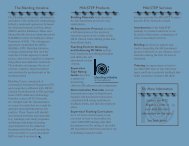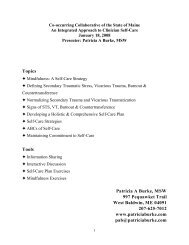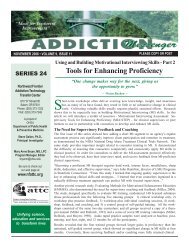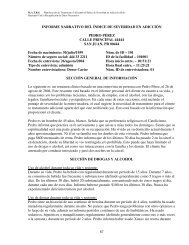Clinical Supervision: A Key to Treatment Success
Clinical Supervision: A Key to Treatment Success
Clinical Supervision: A Key to Treatment Success
Create successful ePaper yourself
Turn your PDF publications into a flip-book with our unique Google optimized e-Paper software.
<strong>Clinical</strong> <strong>Supervision</strong>: A <strong>Key</strong> <strong>to</strong> <strong>Treatment</strong> <strong>Success</strong><br />
By Gail D. Dixon, M.A., CAPP, NIDA Project Manager<br />
Southern Coast Addiction Technology Transfer Center (SCATTC)<br />
Intense competition for limited substance abuse program funds, combined with<br />
increased scrutiny of program costs and results, has created a need for better<br />
understanding of how clinicians, organizations and systems can work <strong>to</strong>gether<br />
<strong>to</strong> improve treatment outcomes. While clinical supervision has long been<br />
regarded as a significant part of the addiction treatment process, the importance<br />
of effective supervision has gained increased attention in this competitive<br />
environment. The emphasis on evidence-based practice has also contributed <strong>to</strong><br />
renewed focus on the supervision process. This article will focus on the elements<br />
of effective clinical supervision in addiction treatment and explore the<br />
role of the clinical supervisor in an evidence-based practice environment.<br />
Definition of <strong>Clinical</strong> <strong>Supervision</strong><br />
A variety of definitions for clinical supervision exist. Differences typically<br />
reflect aspects of the author's discipline and training focus. Bernard and<br />
Goodyear (1998) offer this definition that has come <strong>to</strong> be accepted within the<br />
counseling profession:<br />
<strong>Supervision</strong> is an intervention that is provided by a<br />
senior member of a profession <strong>to</strong> a junior member or<br />
members of that same profession. This relationship is<br />
evaluative, extends over time, and has the simultaneous<br />
purposes of enhancing the professional functioning of<br />
the junior member(s), moni<strong>to</strong>ring the quality of professional<br />
services offered <strong>to</strong> the clients she, he, or they<br />
see(s), and serving as a gatekeeper of those who are <strong>to</strong><br />
enter the particular profession. 1<br />
This definition identifies the participants in the relationship, the quality of the<br />
relationship and its purposes. The elements of this definition are present <strong>to</strong><br />
varying degrees in all models of clinical supervision.
Models of <strong>Supervision</strong><br />
There are significant parallels between the supervision<br />
of staff and therapeutic work with clients. In both<br />
relationships, one participant is charged with the<br />
responsibility of facilitating growth and change in the<br />
other participant through focused or structured<br />
interactions. There are some critical differences<br />
between counseling and supervision. Gallon (2002)<br />
has provided the following framework <strong>to</strong> make the<br />
comparison: 2<br />
in developmental psychology–the description,<br />
explanation and modification of individual behavior<br />
across the life span. Such models are based on<br />
two basic assumptions:<br />
· In the process of moving <strong>to</strong>ward competence,<br />
counselors move through a series of stages<br />
that are qualitatively different from one<br />
another<br />
· Each supervisee stage requires a qualitatively<br />
different supervision environment if optimal<br />
supervisee satisfaction and growth are <strong>to</strong><br />
occur (Chagon and Russell, 1995). 3<br />
One of the most prominent writers on clinical<br />
supervision for the addiction treatment field is Dr.<br />
David Powell. Powell (1993) indicates that a model<br />
of supervision has a number of layers:<br />
· Philosophical foundation - the theory of<br />
change that underlies the counseling approach<br />
<strong>to</strong> be used;<br />
· Descriptive Dimensions - specific characteristics<br />
of the counseling and supervision processes;<br />
· Contextual fac<strong>to</strong>rs - characteristics of client,<br />
counselor, supervisor and setting that affect<br />
the supervision environment; and<br />
· Stage of development - level of training,<br />
knowledge and skill of both supervisor and<br />
counselor. 4<br />
In general, models of clinical supervision have been<br />
classified by the philosophical framework that underlies<br />
the process. <strong>Clinical</strong> supervision models fall in<strong>to</strong><br />
these four basic categories: psychotherapy-based,<br />
developmental, social-role and eclectic.<br />
Developmental models of supervision have dominated<br />
supervision thinking and research since the 1980s.<br />
Developmental conceptions of supervision are rooted<br />
In Powell's view, the focus of supervision is behavioral<br />
change and skill acquisition. In other words,<br />
the emphasis should be on helping staff learn how<br />
<strong>to</strong> use personal skills and attributes in counseling <strong>to</strong><br />
promote behavioral change in the client. Powell<br />
notes that models of supervision have tended <strong>to</strong><br />
emphasize either skill development or the emotional/interpersonal<br />
dynamics and self-discovery of<br />
the worker. In chemical dependency, the emphasis
<strong>Clinical</strong> <strong>Supervision</strong>: A <strong>Key</strong> <strong>to</strong> <strong>Treatment</strong> <strong>Success</strong><br />
has been on skill development. However, newer<br />
models have incorporated both. S<strong>to</strong>ltenberg and<br />
Delworth (1987) have developed an integrated<br />
developmental model for supervision that is used by<br />
Powell. In this model, the developmental levels of<br />
both counselor and supervisor are viewed with<br />
regard <strong>to</strong>: au<strong>to</strong>nomy, self and other awareness and<br />
motivation. 5<br />
Critical Issues in <strong>Supervision</strong><br />
In most addiction treatment agencies, clinical and<br />
administrative supervision are performed by the<br />
same person. It is important <strong>to</strong> balance the time<br />
spent in supervision between these two elements. A<br />
supervisor is very often positioned within the organization<br />
between upper management and front-line<br />
staff who are implementing organizational programs<br />
and policies. This micro-macro balance creates an<br />
inherent tension within the demands and expectations<br />
of these two organizational layers. The clinical<br />
supervisor must negotiate this balance in a way that<br />
facilitates both growth in the counselor and effectiveness<br />
in the organization.<br />
It is important <strong>to</strong> consider ethical principles that<br />
influence the practice of supervision. The same<br />
concerns for appropriate boundaries, maintaining<br />
confidentiality and unconditional positive regard<br />
that characterize the counseling relationship apply <strong>to</strong><br />
the relationship between counselor and supervisor.<br />
The clinical supervisor must also make a commitment<br />
<strong>to</strong> his or her own growth and skill development<br />
within the changing context of the addiction<br />
field in order <strong>to</strong> provide the highest quality of<br />
supervision possible.<br />
The clinical supervision process focuses on building<br />
particular counselor skills or competencies.<br />
Role of <strong>Clinical</strong> <strong>Supervision</strong> in<br />
Evidence-Based Practice<br />
<strong>Clinical</strong> supervision has taken on increasing importance<br />
as the addiction field has moved <strong>to</strong>ward<br />
evidence-based practice. Often, the clinical supervisor<br />
is the critical agent of change within the addiction<br />
treatment agency. As a change agent, the<br />
clinical supervisor must be familiar with the change<br />
process, adept at assessing readiness <strong>to</strong> change both<br />
within the agency and the counselor, and skilled at<br />
overcoming resistance. Another part of the supervision<br />
challenge is <strong>to</strong> be an advocate for the counselors<br />
(and by extension the clients) by promoting<br />
changes in the organization that can facilitate and<br />
enhance the work of the counselors. Counselors<br />
may have higher levels of satisfaction and be more<br />
productive if they feel organizational policies are<br />
working for and not against them. This challenge<br />
usually falls on the supervisor's shoulders. While<br />
managers and administra<strong>to</strong>rs often initiate the move<br />
<strong>to</strong>ward evidence-based practice within a particular<br />
setting, supervisors and counselors are key <strong>to</strong> understanding<br />
which specific evidence-based interventions<br />
are timely and relevant for their clients' problems.<br />
That means they must provide leadership in the<br />
agency on the selection of evidence-based practices<br />
that address these needs.<br />
One critical area of supervision in the evidencebased<br />
environment is the focus on training. Counselors<br />
and supervisors often tend <strong>to</strong> seek training in<br />
small doses of novel treatment models rather than<br />
the more intensive dosage needed <strong>to</strong> fully master a<br />
specific evidence-based model. To provide leadership<br />
and promote staff development, supervisors<br />
must also be well trained in the evidence-based<br />
practice (and its conceptual model) that is being<br />
implemented and must be able <strong>to</strong> moni<strong>to</strong>r adherence<br />
<strong>to</strong> that model. The clinical supervisor may be<br />
required <strong>to</strong> supplement initial training with both<br />
formal and informal follow-up learning opportunities.<br />
In addition, the clinical supervisor may be<br />
given the responsibility of moni<strong>to</strong>ring adherence <strong>to</strong><br />
the evidence-based model <strong>to</strong> assure fidelity in implementation.<br />
This task may be difficult for supervisors<br />
whose philosophy of supervision has been more<br />
explora<strong>to</strong>ry or insight-oriented, rather than skillfocused.<br />
Additional training in supervision for the<br />
specific evidence-based practice may be required.
The Southern Coast ATTC has identified training in<br />
clinical supervision as one of its strategic priorities. In<br />
the fall of 2003, we offered a series of three-day<br />
courses in clinical supervision in five cities throughout<br />
Florida. We are currently developing our training<br />
calendar for 2004 and will offer this course again.<br />
The ATTC is committed <strong>to</strong> developing the addiction<br />
workforce <strong>to</strong> respond <strong>to</strong> the demands of a changing<br />
practice environment. Equipping supervisors <strong>to</strong> fulfill<br />
their critical functions within the treatment framework<br />
is a key aspect of that development.<br />
<strong>Clinical</strong> <strong>Supervision</strong>: A <strong>Key</strong> <strong>to</strong> <strong>Treatment</strong> <strong>Success</strong><br />
References<br />
1<br />
Bernard & Goodyear, B. (1998). Fundamentals of <strong>Clinical</strong> <strong>Supervision</strong>.<br />
(2nd ed.). Bos<strong>to</strong>n: Allyn & Bacon.<br />
2<br />
Gallon, S. (2002) <strong>Clinical</strong> <strong>Supervision</strong> Training Manual. Portland, OR:<br />
Northwest Frontier ATTC.<br />
3<br />
Chagon, J., & Russell, R. K. (1995). Assessment of supervisee<br />
developmental level and supervision environment across supervisor<br />
experience. Journal of Counseling and Development. 73, 553-558.<br />
4<br />
Powell, D. (1993). <strong>Clinical</strong> <strong>Supervision</strong> in Alcohol and Drug Abuse<br />
Counseling: Principles, Models and Methods. New York: Lexing<strong>to</strong>n<br />
Books.<br />
5<br />
S<strong>to</strong>ltenberg, C. D., & Delworth, U. (1987) Supervising counselors and<br />
therapists. San Francisco, CA: Jossey-Bass.<br />
RESOURCES FOR CLINICAL SUPERVISION<br />
Arrasmith, D. and Gallon, S. L., (2001). Performance Assessment<br />
Rubrics for the Addiction Counseling Competencies. Salem,<br />
Oregon: Northwest Frontier Addiction Technology Transfer<br />
Center.<br />
Center for Substance Abuse <strong>Treatment</strong> (1998) Addiction Counseling<br />
Competencies: The Knowledge, Skills and Attitudes of<br />
Professional Practice.<br />
Technical Assistance Publications Series #21 DHHS Publication<br />
No (SMA) 98-3171<br />
Powell, D. (1993). <strong>Clinical</strong> <strong>Supervision</strong> in Alcohol and Drug<br />
Abuse Counseling: Principles, Models and Methods. New York:<br />
Lexing<strong>to</strong>n Books<br />
S<strong>to</strong>ltenberg, C.D. & Delworth, Uc. (1987). Supervising Counselors<br />
and Therapists. San Francisco: Jossey-Bass.<br />
Online course in <strong>Clinical</strong> <strong>Supervision</strong> using Powell’s text:<br />
www.dlcas.com<br />
Information about distance education in addictions:<br />
www.nattc.org/addictionEd/index.asp










